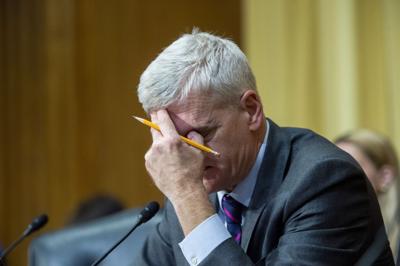WASHINGTON – U.S. Sen. Bill Cassidy took to the Senate floor Monday afternoon to complain about changes to the national flood insurance program.
The federal program pays damages from floods and rising waters because homeowners’ insurance sold by private companies specifically refuse to cover flood damage and those policies are required to obtain a mortgage.
Flood insurance, on the other hand, is a voluntary purchase for most. In Louisiana, where homes are far more likely to be flooded, homeowners can purchase policies from the federal government through their insurance agent.
The policies help disaster victims get back on their feet after high water. Recently, however, the National Flood Insurance Program has received more claims than money to pay for them, requiring taxpayers to cover the difference.
Many inland property owners don’t like paying to help cover those who live near the coast and have pressed Congress over the past decade to force the NFIP to pay for itself, which has led to a change in the way premiums are calculated.
Generally, policy prices are figured using complex algorithms that involve estimates of how likely insurance actuaries think a specific property might be flooded. Louisiana’s congressional delegation has been struggling without success to get information on what exactly goes into the calculations.
The new formulas have caused some Louisiana homeowners and business people to pay significantly more for flood insurance.
“We are talking about the financial crisis unfolding at kitchen tables across my state,” Cassidy said in speech before a nearly empty Senate chamber. “Families cannot afford the premium hikes that NFIP is planning with Risk Rating 2.0. For some, premiums have become unaffordable and could collapse the value of their home.”
Flood insurance policy prices can’t be increased more than 18% per year, but that amount compounds each year.
He mentioned a retired couple living on a fixed in Lafourche Parish. The flood insurance premium on their home of more than a half century has gone from $500 a year to $500 a month – an amount they can’t afford and likely will require them to drop their policy.
Cassidy said about a quarter of policyholders will drop their policies as too expensive and thereby decrease the number of policyholders contributing to the fund NFIP uses to pay some of the damages policyholders suffer during a disaster.
“Louisiana has been hit hard by hurricanes over the past few years—Ida, Delta, Zeta, and Laura,” Cassidy said. “With Risk Rating 2.0, it feels like the administration is kicking us when we are trying to get back on our feet. So, it begs the question, why did they allow Risk Rating 2.0 to take effect? …President Biden could have stopped it with a stroke of a pen. He had the power. He should have asked FEMA to delay or cancel the implementation of Risk Rating 2.0—or reconsider it altogether.”

